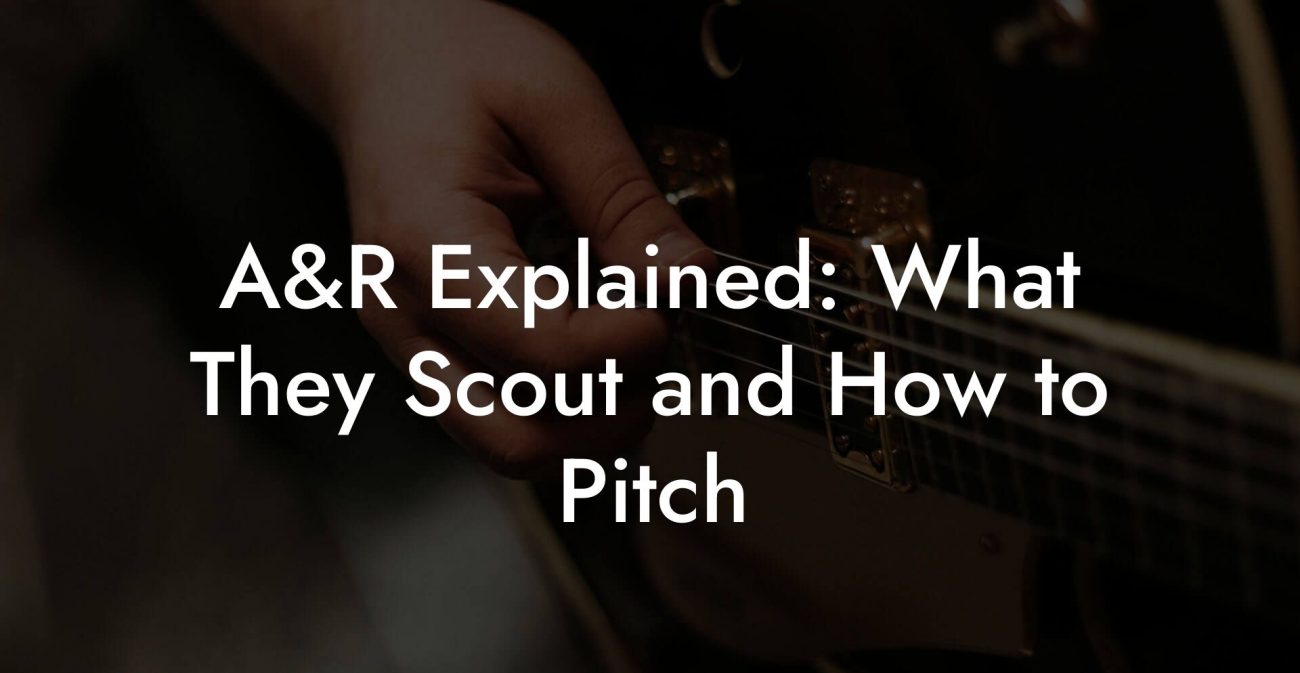Songwriting Advice
Building Your Creative Team (Producer Mixer Publicist)

Want to stop being the one person trying to be a band manager producer graphic designer social media strategist and session player all at once? Good. You need a team. Not a corporate sitcom committee. A lean crew who gets the job done and keeps your vision intact. This guide tells you who to hire when how much to pay what to expect and how to avoid people who ghost you after taking your deposit.
Quick Interruption: Ever wondered how huge artists end up fighting for their own songs? The answer is in the fine print. Learn the lines that protect you. Own your masters. Keep royalties. Keep playing shows without moving back in with Mom. Find out more →
Quick Links to Useful Sections
- Why a creative team matters
- Who you need now and who you can wait on
- Stage one: Starting out independent
- Stage two: Releasing consistently and gigging
- Stage three: Growing audience and income
- Role breakdown and what to expect
- Producer
- Mixer
- Mastering engineer
- Publicist
- Manager
- Booking agent
- Lawyer
- A and R
- How to find winners not drama queens
- Finding a producer
- Finding a mixer
- Finding a publicist
- Finding a manager
- Hiring process and the first call
- What to pay and where to invest
- Contracts credits and splits made human
- Producer agreements
- Mixer and mastering agreements
- Publicist agreements
- Songwriting and publishing splits
- Metadata and release logistics you must not ignore
- Working relationships and communication etiquette
- How to brief a producer or mixer without sounding amateur
- Negotiation tactics that do not make people hate you
- Red flags to avoid
- Case studies real life examples
- Case one: Single by weekend hustler
- Case two: Band that over traded equity
- Scaling your team as you grow
- How to manage conflicts within the team
- Templates you can steal
- Intro email to a producer
- Simple producer agreement checklist
- Common questions answered briefly
- When should I hire a publicist
- Do I need a manager before a label deal
- How do I split songwriting credits fairly
- Action plan you can use today
- FAQ
Everything is written for busy artists who want results. Expect real world scenarios and messy truth in plain language. Terms and acronyms are explained so you do not have to spam your group chat asking what PRO stands for. By the end you will know which roles matter at each stage of your career how to find them how to speak to them and what professional red flags look like in the wild.
Why a creative team matters
You can DIY forever. That will teach you humility and a lot of software shortcuts. But a team multiplies leverage. A good producer raises the song from demo to record. A skilled mixer clarifies the emotion. A publicist places your story in front of editors and playlists that matter. A manager keeps your calendar and budget from imploding.
Think of a team like a motorcycle gang that actually pays rent. Each person handles a major task so you can focus on the work you do best. The faster you reach the right ears the faster you get paid and the more options you earn.
Who you need now and who you can wait on
Not everyone is required from day one. Here is a practical timeline mapped to where you might be in your career.
Stage one: Starting out independent
- Producer or beat maker if you make songs from scratch
- Mixer for a single or EP once you have songs ready
- Graphic designer for cover art and social assets
- Digital distributor to get music onto streaming platforms
Stage two: Releasing consistently and gigging
- Publicist for single campaigns and playlist pitching
- Booking agent or independent promoter for tours and shows
- Manager for business deals scheduling and strategy
- Video director for major singles and visual content
Stage three: Growing audience and income
- Lawyer for contracts and rights management
- Publishing administrator and sync agent for licensing
- Dedicated social media manager
- Full time A and R contact if you work with labels
Role breakdown and what to expect
Below are the common roles you will see. For each role we will define it list typical fees and give a real life scenario so you can imagine the relationship.
Producer
Definition
A producer shapes the arrangement the sonic choices and often the performance. Some producers write parts and beats. Some focus on capturing great vocal takes and guiding performance choices. The role can overlap with songwriter or instrumentalist.
Typical fees
- Flat rate per song for beat oriented producers can range from small trade work to several thousand dollars depending on credentials
- Producer points mean a percentage of the record revenue. New producers may take 1 to 5 percent. Established producers can ask for higher points and larger upfront fees
Real life scenario
You have a demo with acoustic guitar and a rough vocal. You hire a producer who adds synth pads a drum arrangement and guides you to change the chorus melody for a bigger hook. The result is a radio ready track and the producer asks for a small point and a modest studio fee. The song opens doors you could not on your own.
Mixer
Definition
A mixer combines all recorded elements adjusting levels equalization stereo placement effects and dynamics so the song sounds cohesive. The mixer is not usually responsible for the creative arrangement. The goal is clarity and emotional impact across headphones and car speakers.
Typical fees
- Independent mixers can charge from a few hundred to a few thousand per track
- Top tier mixers with credits on major records can charge much more and may require a send in stems workflow
Real life scenario
You hire a well known mixer for a single. You send stems which are separate exported tracks such as vocals drums and bass. The mixer returns a polished mix that makes your vocal sit forward in playlists. You get radio interest because the track translates well to small devices and club systems.
Mastering engineer
Definition
Mastering finalizes the mixed audio to industry loudness standards and ensures consistency across playback devices. A mastering engineer will also deliver final files ready for distribution.
Typical fees
- Mastering per track tends to be an affordable line item compared with mixing
- Albums can be packaged for a bundle rate
Real life scenario
After mixing you send the stereo mix to mastering for final polish. The mastering engineer tightens low end and sets final volume. The track now competes sonically with other songs on playlists.
Publicist
Definition
A publicist works to place your music and story in media outlets blogs radio shows and playlists. They pitch journalists secure interviews and create campaigns that position your release in front of tastemakers.
Typical fees
- Campaigns vary widely. Small campaigns can be a few hundred to a few thousand dollars for a single rollout
- Longer term PR relationships cost more and can include monthly retainers
Real life scenario
You hire a publicist for an EP campaign. They secure a premiere on an influential blog a review in a regional paper and a playlist add in a niche playlist. Those placements create a spike in streams and a few serious booking inquiries.
Manager
Definition
A manager is your operational leader. They coordinate team members negotiate deals and keep long term strategy in focus. Managers typically take a percentage of artist income and may front costs for campaigns then recoup them.
Typical fees
- Standard manager commission is around 15 to 20 percent of artist gross income
- Some managers prefer a sliding scale or separate service fees for certain projects
Real life scenario
A manager spots inefficiencies in your schedule and consolidates studio time with session musicians. They negotiate a sync deal and handle the legal paperwork leaving you to write and perform. The manager gets paid from the income they help generate.
Booking agent
Definition
A booking agent secures live shows and tours. They have relationships with promoters venues and festival bookers. Agents can be exclusive or work on a commission basis.
Typical fees
- Agents usually take 10 to 20 percent of the gross live fees
- Smaller DIY tours may be booked by artists with promoter partners taking a cut of the door
Real life scenario
You want a regional tour. A booking agent who knows the local scene gets you weekend dates in cities lined up logically. They also ensure rider and technical needs are handled so shows run smoothly.
Lawyer
Definition
A music lawyer reviews contracts protects your rights advises on deals and helps set up business entities. A lawyer is crucial before signing any transfer of rights or long term deals.
Typical fees
- Lawyers charge hourly rates or flat signing fees. Initial consults may be free or low cost
- Label deals and publishing splits should be reviewed with legal counsel
Real life scenario
A label offers a deal that sounds generous on the surface. Your lawyer spots language that hands over masters for a long period. With counsel you renegotiate terms to keep control of your masters after a reasonable term.
A and R
Definition
A and R stands for Artists and Repertoire. These people work at labels and scout artists help develop artistic direction and link artists to resources such as producers and songwriters.
Typical fees
- A and R are usually not hired directly by artists. Instead A and R work for labels and may offer development deals
Real life scenario
An A and R rep attends a local showcase sees you perform and offers a development meeting. They connect you with a producer for a session and help plan a release strategy if everyone clicks.
How to find winners not drama queens
Finding the right people is a mix of networking research and instincts. Here is a practical checklist for each role.
Finding a producer
- Listen to credits in songs you love. If the overall tone matches your taste check that producer
- Use production marketplaces and forums to hear reels and get references
- Ask artists you respect for recommendations and for both positive and negative feedback
- Start with a small paid session to test chemistry before committing to an album
Finding a mixer
- Request full before and after mixes not just highlight reels
- Ask for genre relevant credits and stems so you can judge how they treat your style
- Test with one track and compare different mixers on the same song if budget allows
Finding a publicist
- Check client lists and ask to see campaign results and coverage lists
- Prefer specialists who understand your genre rather than generalists who promise everything
- Make sure they pitch to outlets that matter for your target audience
Finding a manager
- Look for someone with relevant industry contacts not just enthusiasm
- Agree on clear deliverables and review cadence before signing anything
- Start with a trial period or joint project based agreement
Hiring process and the first call
Your first conversation sets the tone. You are not auditioning for a spouse. You are checking for competence and chemistry. Keep it focused and short.
Use this mini script for the first call
- Quick intro. Two sentences about your sound and goals
- Ask about their recent projects and their role in those projects
- Ask what they need from you to start and what the timeline could look like
- Ask for a straightforward price range and payment terms
- Ask for references and follow up with those artists
Red flags
- Vague answers about work process or who actually does the work
- Pressure for large upfront payments without a clear deliverable
- Lots of promises but no verified credits or references
- Someone who wants to change your sound immediately without hearing the demo
What to pay and where to invest
Budgeting is not glamorous but it is the act of self respect. Money spent poorly is more damaging than money held back. Here is a simple priority list for an independent single release.
- Producer and recording 40 percent of your budget for sound quality and capture
- Mixer and mastering 20 percent combined to ensure it translates everywhere
- Publicist and marketing 20 percent for visibility and coverage
- Artwork and video 10 percent for assets that convert listeners to fans
- Reserve 10 percent for unexpected costs and licensing
Note: percentages are a guideline. If you have a DIY producer who also mixes you can shift funds to PR and visuals.
Contracts credits and splits made human
Contracts exist so you do not regret decisions later. Never sign anything that hands away rights without a clear return. Key things to lock down in writing are ownership splits payment schedule deliverables timelines and usage rights.
Producer agreements
- Will they take points or a flat fee? Points mean they earn a percentage of future income
- Define what a session includes how many revisions and what constitutes the final deliverable
- Clarify who pays for session musicians and studio time
Mixer and mastering agreements
- Make sure you own the final masters after payment
- Define revision limits and additional fees for extra revisions
- Ask for high quality stems and the final master in multiple formats
Publicist agreements
- Define campaign length and deliverables such as number of pitches and placements targeted
- Publicists do not control editorial decisions. Avoid contracts that guarantee specific placements
Songwriting and publishing splits
Who wrote what needs to be agreed on day one because splits become messy later. If someone contributes to melody or core lyrics they usually deserve a share. The split can be equal or negotiated by contribution. Register splits with your publishing administrator and your performance rights organization so money flows correctly.
Metadata and release logistics you must not ignore
Technical things matter. Bad metadata kills royalty payments and makes your catalog unsearchable. Here are essentials to manage before release.
- UPC code for the release. This is the product code for digital stores
- ISRC codes for each track. These are unique identifiers for recordings
- Correct songwriter and publisher data for each track
- PRO registration. PRO stands for Performing Rights Organization. Examples are ASCAP BMI and SESAC. Register your songs so you get performance royalties
- Distributor account set up and advance scheduling for release windows
Working relationships and communication etiquette
People remember the tone you bring more than your excuses. Be professional even when the process is messy. Here is a pragmatic code of conduct.
- Always confirm deadlines in writing and share a project timeline
- Pay invoices within agreed terms. Late payments sour relationships fast
- Respect creative space. Do not text a mixer at midnight asking for mix changes
- Deliver what you promised. If your producer asks for dry vocals deliver clean takes not your phone recording
How to brief a producer or mixer without sounding amateur
Bad briefs lead to wasted time. A good brief is simple clear and includes references not demands. Use this template.
Brief template
- Track title and rough demo link
- Reference tracks with timestamps explaining what you like
- Target audience and use case such as radio club or sync
- Vocal comp or rough guide and whether you want full vocal comping
- Deadline and any non negotiable dates
- Budget range and payment terms
Negotiation tactics that do not make people hate you
Negotiation is not a WWE match. Be honest about budget and ask what options exist. Here are practical moves.
- Offer a smaller upfront payment plus backend points if you are low on cash
- Ask for a payment plan or milestone based payments for longer projects
- Trade value. If you have social reach offer promotion swaps but be realistic and measurable about what you can deliver
- If a person is inflexible on price ask for a scaled package such as fewer revisions or a basic mix instead of a top line mix
Red flags to avoid
- Someone who guarantees playlist adds or editorial coverage. Nobody can promise that reliably
- Pressuring you to sign over masters or publishing without clear compensation
- Ghosting after a partial payment
- Lack of written agreement for anything beyond a handshake
Case studies real life examples
Case one: Single by weekend hustler
Background
An independent singer songwriter had a strong demo and 3 thousand followers online but no team. They hired a producer for a single at a modest flat rate and a mixer who agreed to a small revision fee. They DIYed their cover art and used a distributor to release the track. The producer suggested a publicist who worked on a small campaign in exchange for a limited time. The song received a blog premiere and a playlist add in a niche playlist. Streams grew and a booking inquiry arrived for a local festival.
Lesson
Smart targeted spending on production and a small PR campaign delivered measurable benefits. The artist kept control of masters and registered with their PRO ensuring performance royalties.
Case two: Band that over traded equity
Background
A band signed a deal with a producer who also offered a label style full service deal including distribution and radio pushes. The band accepted points and signed a long term masters agreement without legal review. A year later they realized that the deal gave the producer ownership of future masters for multiple albums and limited their ability to license tracks.
Lesson
Always have a lawyer review deals that affect ownership. Short term gains from reduced costs can create long term traps that are expensive to correct.
Scaling your team as you grow
As revenue grows you should scale team members who deliver leverage. Prioritize hires who buy you time and open new income streams. A manager and a lawyer are typically the earliest hires once you start earning steady money. At the point when touring is regular a booking agent becomes essential because their efficiency pays for itself in better routing and higher guarantees.
How to manage conflicts within the team
Conflicts will happen. Prevent escalation by setting expectations early and documenting decisions. If personalities clash focus on objective outcomes and reassign tasks if needed. If someone is consistently underperforming replace them sooner than later. Reputation matters more than loyalty to a person who breaks deals.
Templates you can steal
Intro email to a producer
Subject line: Session interest for Track Title
Hi Name,
I am Artist Name. I love your work on Reference Track 1 and Reference Track 2. I have a demo for Track Title at demo link. The song is a modern indie pop track and I am looking to record and produce it in March. My budget for production is Budget Range and I can be flexible with timelines. Could we set a 20 minute call to talk about availability and what you would need to start? Happy to send stems and more references. Thanks for your time. Artist Name links
Simple producer agreement checklist
- Names and contact information of parties
- Scope of work and deliverables
- Payment schedule and amounts
- Ownership of masters and any points on revenue
- Revision limits and timelines
- Termination clause and dispute resolution
Common questions answered briefly
When should I hire a publicist
Hire a publicist when you have a clear single or EP release and a press ready angle. Publicity works best when combined with quality production and strong assets such as photos and video. Do not hire PR before you have something newsworthy to pitch.
Do I need a manager before a label deal
No. You can negotiate deals without a manager but a manager helps you avoid bad contracts and coordinate team members. If you are getting serious offers a manager is a wise investment to protect and grow your career.
How do I split songwriting credits fairly
Discuss contributions upfront. If someone wrote melody or core lyrics they usually deserve a share. Use simple percentages and document them. Register the splits with your PRO and publisher before release so royalties flow correctly.
Action plan you can use today
- List your top three priorities for the next release such as production quality publicity or live shows
- Build a 90 day budget and allocate funds using the priority list
- Research two producers and two mixers who fit your genre and reach out with the brief template
- If you plan a PR push request campaign results from prospective publicists and check references
- Document any verbal agreements in a short email so everyone has the same expectations
FAQ
What does a producer actually do
A producer shapes the sound arrangement and performance of a track. They may write reach out for session players choose sounds guide vocal takes and shape the direction of the recording. Producers range from beat makers to full scale project leaders who shepherd records from demo to release.
How much should I pay a mixer
Expect to budget from a few hundred to several thousand dollars per track depending on the mixers experience and credits. Compare before and after stems and ask for revision limits so you know what is included.
How do publicists get paid
Publicists are paid via monthly retainers flat project fees or per campaign rates. Some publicists may work for reduced fees for equity in other parts of your project but be cautious about deals that trade money for vague promises.
Should I give away points to producers or mixers
Points should be considered carefully. Points mean ongoing revenue for the person who helped you. If you are low on cash offering points can be fair. If you can pay a reasonable fee up front it is often better to keep the long term rights and earnings.
What is the single most important hire for an independent artist
There is no single answer but the early hires that multiply your impact tend to be a producer who can deliver a great single and a mixer who makes that single translate across platforms. After that invest in publicity and management as revenue grows.




